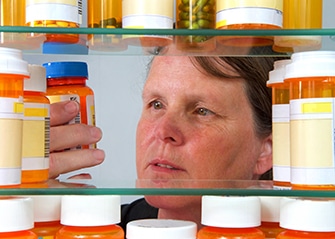What are the Signs of Opioid Use?
Opioids are a group of drugs derived naturally from the poppy plant, or are man-made in a laboratory, also known as synthetic opioids. Opioids are generally prescribed to individuals suffering from chronic pain, whether from surgery, a major injury or other health issues. Legally prescribed opioids include morphine, codeine, and oxycodone, while illegal opioids include heroin. It is easy to know if an individual is using opioids if they’ve been prescribed, but it is also important to know the signs of opioid use if it has crossed the line into an addiction.
Signs and Symptoms
There are many symptoms and signs of opioid use, including physical signs, behavioral signs, and psychological signs.
Physical Signs of Opioid Use
- Marked weight gain or weight loss
- Decrease in appetite
- Increased energy
- Insomnia
- Increased heart rate
- Dilated pupils
- Unkempt appearance
Behavioral Signs of Opioid Use
- Isolation. Individuals who are suffering from opioid use disorder tend to isolate themselves from loved ones to hide their addiction.
- Unable to slow or stop use. Not being able to control how many opioids they are taking and when is a hallmark of addiction.
- Life revolves around opioids. A major sign of opioid use is if the individual spends a lot of time looking for opioids, taking opioids, and recovering from opioids. This can also include taking opioids at inappropriate times or while performing dangerous activities such as driving or being responsible for children.
- A shift in priorities. Opioid use can be responsible for people abandoning hobbies or activities they once enjoyed, poor performance in work or school and not attending family functions or events in favor of opioid use.
Psychological Signs of Opioid Use
- Anxiety
- Depression
- Irritability
- Mood swings
- Defensiveness when confronted about use
- Psychosis
Dangers of Opioid Use
There are many dangers associated with opioid use, the worst being death. Opioid overdose can occur for anyone taking opioids, especially those who have formed an opioid use disorder.
- 70,237 drug overdose deaths occurred in the United States in 2017
- Opioids—mainly synthetic opioids (other than methadone) are currently the main driver of drug overdose deaths
- Opioids were involved in 47,600 overdose deaths in 2017 (67.8% of all drug overdose deaths)
- From 1999 to 2017, almost 218,000 people died in the United States from overdoses related to prescription opioids
- Overdose deaths involving prescription opioids were five times higher in 2017 than in 1999
In addition to a possible opioid overdose, opioid use can cause long-term damage to many parts of the body. These include:
- Constipation
- Sleep-disordered breathing
- Fractures
- Hypothalamic-pituitary-adrenal dysregulation
- Anxiety
Have Narcan Handy
If there are opioids in your home, Narcan should be there as well. NARCAN® Nasal Spray counteracts the life-threatening effects of an opioid overdose. Since most accidental overdoses occur in a home setting, it was developed for first responders, as well as family, friends, and caregivers—with no medical training required. Narcan works by binding to opioid receptors which stops an opioid overdose in its tracks. It is available over-the-counter without a prescription and is covered by most health insurance plans.
Getting Help for Opioid Use Disorder
If you or someone you love is suffering from opioid use disorder, it is important to get help as soon as the signs of opioid use are recognized. Some ways to get help include:
- Research. Naturally, humans are afraid of the unknown. This is especially true with addiction treatment. The more research you are able to do on treatment centers, treatment programs, detox, and aftercare, the more comfortable you or your loved one will be upon entering treatment.
- Make the call. Our admissions specialists are on-hand 24 hours a day, 7 days a week to answer any questions you may have as well as explaining the treatment process in detail.
- Start the conversation. Admitting you need help is difficult, but it is a decision that can save your life. Reach out to your closest supporters to let them know you’re beginning the process of getting help for your opioid use disorder. Alternatively, if your loved one is suffering from addiction, do your best to bring up the subject to them in a loving way.
About Cliffside Malibu
Knowing the signs of opioid use and being prepared for a potential overdose are important things that can save a life during active addiction. So is getting help and treatment for opioid use. The only way to ensure that an opioid overdose does not occur is to stay sober, and we provide the tools and treatment to get you there.
Since no two addictions are the same, Cliffside Malibu offers an individualized treatment plan for every client. We are committed to providing evidence-based treatment through a continuum of care model including medically supervised detox, residential treatment, day treatment, and outpatient services. Our program also includes family therapy and holistic therapy, as well. Whether an individual is suffering from substance abuse and/or alcohol addiction, our programs are structured to create a supportive environment where healing can begin.
In addition to world-class treatment, Cliffside Malibu offers luxury accommodations, a serene environment, five-star dining, and plentiful amenities. We understand that addiction treatment is a rigorous process. Therefore, we provide for your comfort and relaxation at every turn, allowing you to rejuvenate, and meet the demands of treatment with your greatest energy and attention.
For more information on Cliffside Malibu, visit cliffsidemalibu.com
